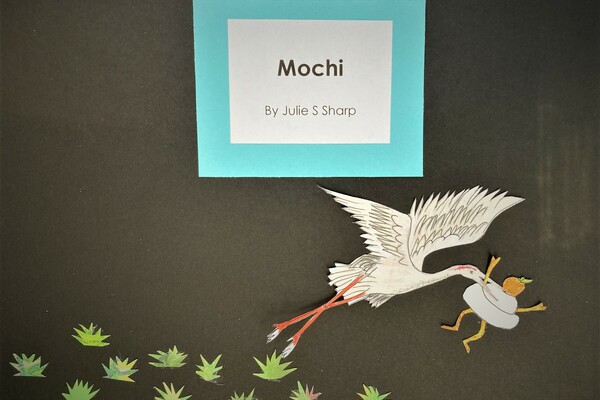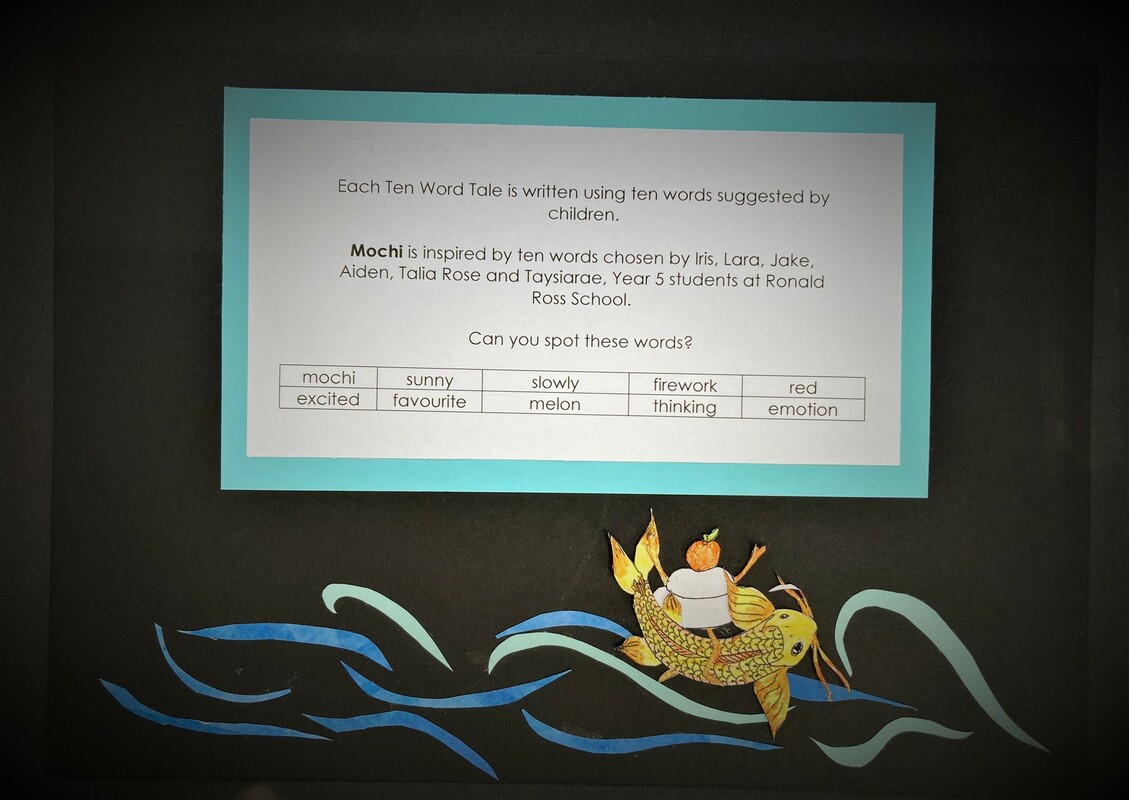
Each Ten Word Tale is written using ten words suggested by children. Mochi is one of two new stories by our Story Spinner inspired by ten words chosen by Iris, Lara, Jake, Aiden, Talia Rose and Taysiarae, Year 5 students at Ronald Ross Primary School. For the first time, our Story Spinner, Julie Sharp, has written two different stories inspired by the same set of words!
Spot the 10 words - mochi, excited, sunny, favourite, slowly, melon, firework, thinking, red, emotion - and enjoy the stories!
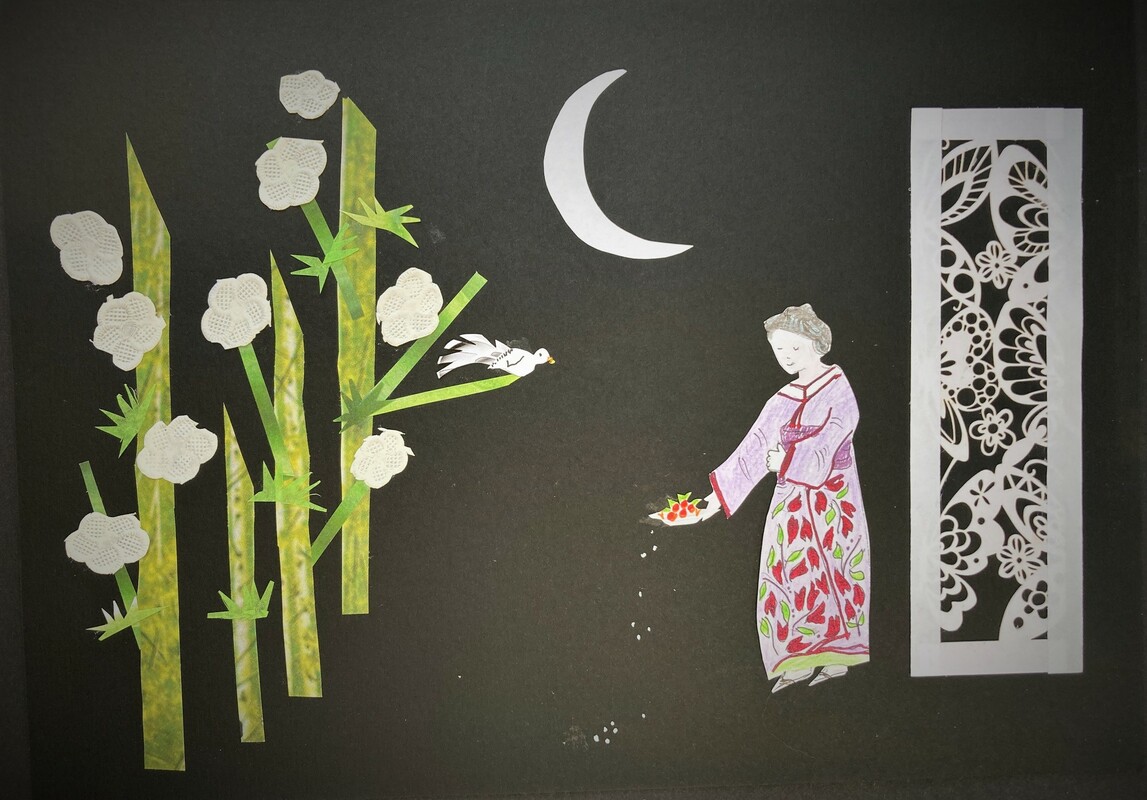
Chapter 1
Azami was not looking forward to New Year. It would be her hundredth birthday. She would follow the traditions, listen for the strikes of the temple bell, make the sweet mochi dumplings with pounded rice and greet her neighbours, but the celebrations would feel empty. As she made the dough for the mochi dumplings, she wept great and sorrowful tears into the rice. When at last the dough was beaten smooth, she made tea and took some bread and cherries and walked slowly into the garden. She had a good friend in the garden, a white bird who would sit beside her: the bird on his branch, she on her bench. She dropped crumbs for him.
Azami’s tears were for her lost family. Ten years ago, there had been a great earthquake where her only granddaughter lived. She had heard that Ayaka, her granddaughter, had died in the earthquake but there was no news of Ayaka’s baby son. Azami had sent many messages but she had heard no more. Today her ten years of sadness felt like twenty years, felt like a thousand. The lost boy might be somewhere in the world, not knowing about her, maybe needing her help.
As she listened to the temple bells echoing through the dark, she bowed her head and prayed. “I am almost as old as the bells but before I die, please let me hear the voice of my great grandson.”
There was a swirl of wind in the garden, the flutter of the white bird flying away amidst a flutter of winter blossoms. Perhaps the kind old wind and the bird would carry her prayer to be answered.
The next day Azami put the sweet dough in the steamer and prepared the mochi fillings: cherry for the neighbours’ children, melon for the priest, his favourite, and red bean paste for herself. She stretched the dough, sticky and sweet, the long strands meaning long life, and wrapped the tasty fillings. For the special shelf in her house she made the traditional figure, two mochi with a tiny tangerine on top. She lit a candle for her lost great grandson, hoping that somewhere he was alive and was well.
Azami’s tears in the mochi and her prayers in the wind had indeed been carried to the ancestors. They listened to the tears, to the prayers. An answer was coming. The New Year wind swept through the wooden shutters of the little house. The candle flickered. There was a sound like a thin egg-shell cracking. The little mochi opened its eyes.
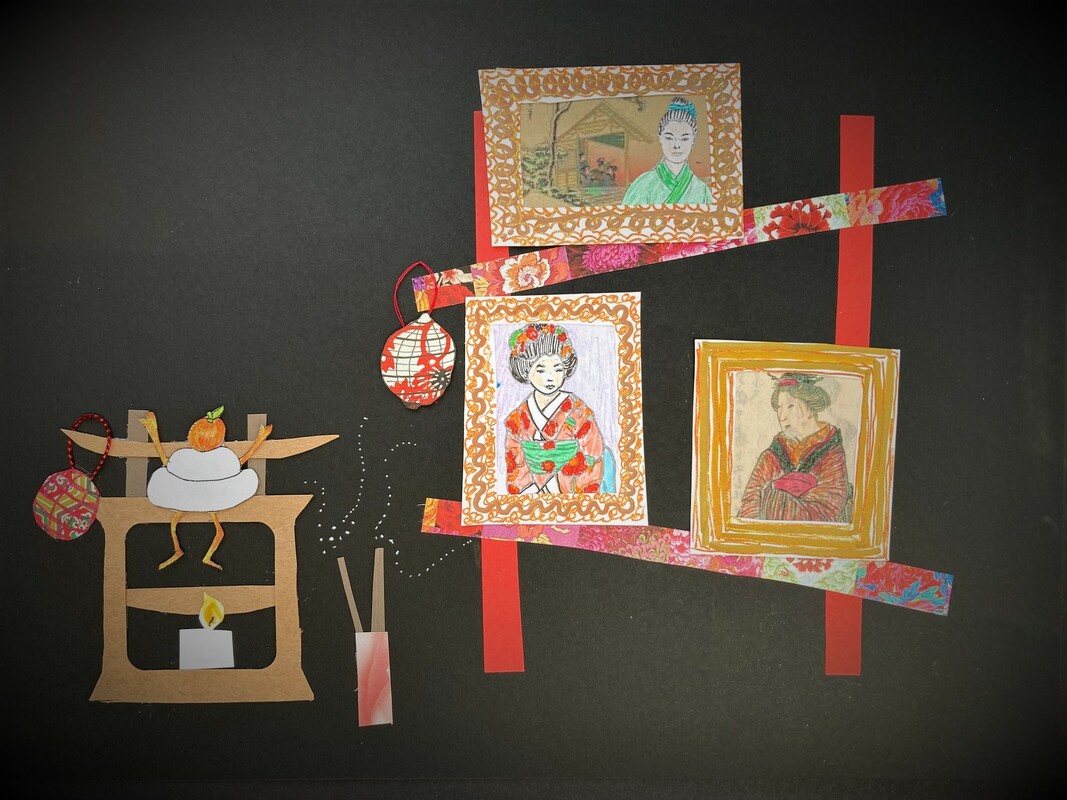
Chapter 2
The little mochi blinked in the candle light. He stretched and arms and legs appeared. He yawned and a wide mouth smiled and smiled. He looked around and saw no one but the family pictures on a bookcase.
“Hello,” said the little mochi.
“Hello,” said the pictures.
The mochi was impressed. “Pictures, you speak! How magic you are!”
The pictures answered, “How magic you are. You can speak and move because Azami has wept tears to make you; you are the answer to her prayer.”
The pictures told the boy about Azami. “Her only granddaughter has passed away to the land of the ancestors but the granddaughter’s little son lives. You must find him and bring him home.”
The little mochi whistled through his tight white lips. He felt excited and full of questions. “That is a big adventure. What must I do? Where must I go? How long do I have?”
“Till the full moon.”
“That is not long,” said the little mochi, looking out of the window where the moon curved, thin and new.
“Which is why you should begin now. Begin with the earth.”
The little mochi looked out at the garden. Here the earth began. He bowed very deeply to the pictures. “Dear Pictures, do I have a name?”
“The name you need is the name of the great grandson. His name is Kōjin. Now go.”
The mochi bowed again. He pushed open the edge of the shutter, climbed onto the branch of the cherry tree and slipped down its trunk, landing in the earth of Azami’s garden, as snow began to fall.
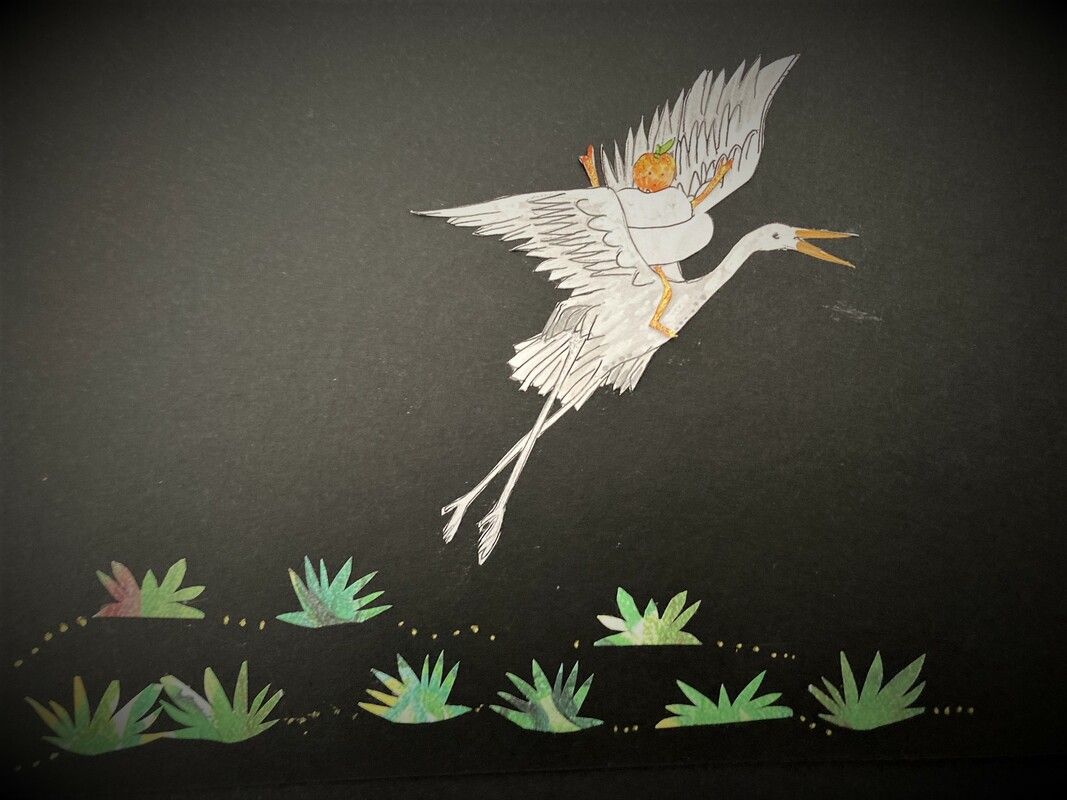
Chapter 3
The little mochi crossed the garden. Snow was falling thickly but he did not feel its cold. He crossed the garden of Azami’s neighbours, and the next garden too. He walked boldly, climbing over rocks and grass and plants that came in his way and dodging the falling snowflakes. There was no one awake to see him and anyway he was hidden, white against the white snow.
At last he came to the end of Azami’s town. He could see countryside stretching out before him. Azami lived on the island of Hokkaido but the little mochi could not see to the sea, just fields and forests. How far could he walk in one day? How would he find the lost boy? He had only as long as the moon.
At that moment there was a sound like hands clapping together. Swooping from the sky came a great crane with great wings beating. The mochi tried to hide under a rock but the bird caught him in his silver-black beak and lifted him from the ground. The bird beat his black and white wings until he rose into the pale morning sky with the mochi.
“Put me down!” called the mochi. The crane took no notice. He flew higher and higher. The mochi closed his eyes: the earth below was far away and he felt dizzy. In his head he was thinking, “I will surely die. The crane will drop me or maybe eat me and Azami will never see her own Kōjin.”
After some hours, the crane flew down and the mochi opened his eyes, preparing to fight the crane and to die nobly. Before he could attack, the crane spoke.
“Do not fight little brother. There is no need to fear me. You have been made of tears and that will always protect you. I have been sent to help you on your journey. Look!”
The mochi looked. He had been brought to a high mountain covered in snow. Stretching out before him was a different land. They had crossed the sea.
“Look out for more help,” said the crane. “It will come.”
The mochi bowed to the crane who took off into the sunny air. The mochi saw a stream and walked towards it. As he drew closer, he heard the water roaring. Closer still and the noise was huge. The stream was becoming a waterfall.
He was looking for help, perhaps someone to carry him as the crane had done, when he heard the croaking voice of a frog.
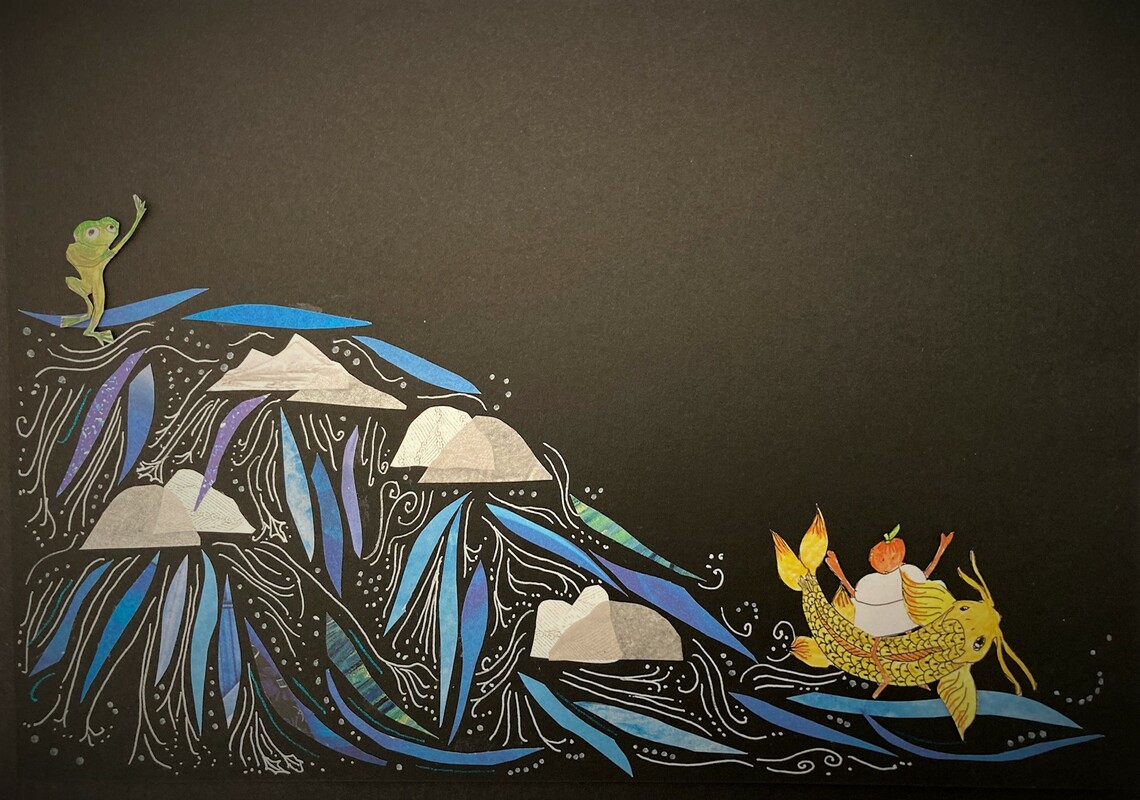
Chapter 4
The frog bowed deeply and greeted him. “Welcome to my waterfall, mochi. To go on, you must dive in.”
“Really?!” The mochi’s voice was squeaky with fear. He would surely never survive.
“Do not fear. This is the river that once carried the boy you seek. It will carry you to him. In the water you will meet a new companion.”
The little mochi thanked the frog, took a deep breath and jumped right in.
He was in a world of silvery bubbles. Tiny stones and glitters of gritty sand swirled round him and over his head. He was tumbling over and over, falling down and down and down. At last he touched a surface. His little feet pushed and pushed. His arms stretched up and up until at last they broke the surface and he was breathing but only just. He felt as if a firework had exploded in his brain. He was shaken and shocked but he was still alive. At that moment he felt something nudging him and saw a golden nose and a beady eye. A fish.
The golden carp explained that she had come to help him. “I know the boy you seek. He has almost caught me three times. I have been chosen as your next companion. You may ride on my back.”
The little mochi hung on to the golden fin of the fish. She swam near the surface so he could see where they were going. She slipped her way down a wide river that flowed into a lake and then out again into a stream, on and on. Three days and nights passed and the fish did not rest. On the journey she told the mochi about Kōjin. “He works for the fisherman who found him when he was a baby, floating on a bed of reeds. The boy has shelter and food but no kindness.”
The mochi thought the boy would be very pleased to know he had a great grandmother who longed for him. The fish agreed. “To be loved, to be hoped for, is most fortunate.” The little mochi knew the moon was growing fuller. They must hurry.
The next day they swam into another lake, with many pools amongst the reeds. They saw a boy sitting on a long wooden boat, with his fishing rod ready. “Here he is,” said the fish. “I will let him catch me, then you can speak to him.”
The fish swam to the boy’s hook. She opened her mouth and swallowed it. The boy felt the fish catch on the line and pulled it up, delighted. A golden carp! He flipped the fish into the bottom of his boat. This would be a tasty meal. He had flipped the fish so high that the little mochi had flown off and hit his head on the bottom of the boat. He lay stunned in a corner as the boy poled his fishing boat back to the shore and the fish fluttered helplessly on the wooden boards. When the boy reached the shore, he climbed out of the boat, put the gasping fish on a stone, and made a fire. The flames began to flicker, red and orange. The golden carp was calling to the mochi for help but the boy only heard the flapping desperation of a dying fish. He picked up a stone to kill her when suddenly he heard a high cry. A tiny white figure was standing on the edge of the boat calling his name. Kōjin! Kōjin! Kōjin!
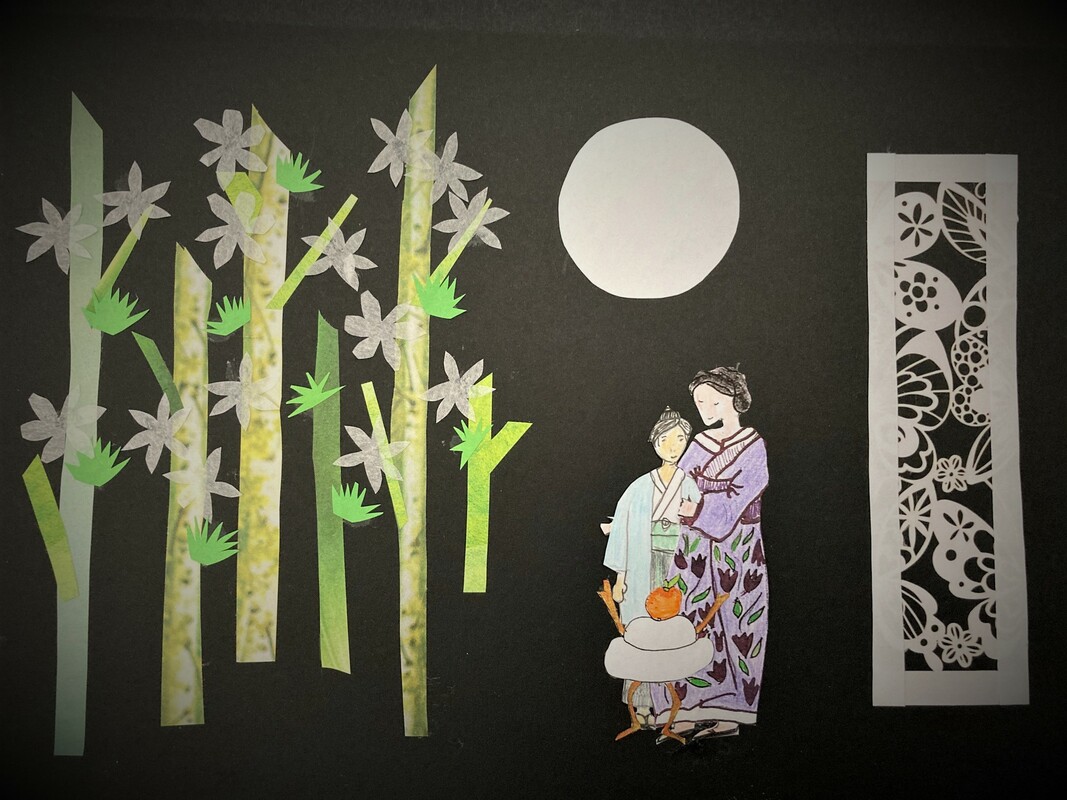
Chapter 5
The boy dropped the stone in his surprise. A little mochi? Calling him by name! The mochi jumped out of the boat and rushed to the fish. The boy Kōjin could see that the strange little person cared about the golden fish -- the mochi was full of emotion, white tears running down his face as he stroked the golden scales -- so the boy picked up the fish and put it back in the lake. The mochi stood on the shore to say good bye. The fish called, “Farewell Mochi. Thank you. Now Amazi is waiting. The full moon is coming. Explain to the boy. Take him home.”
“Mochi,” asked the boy, approaching him. “By what magic do you know my name?”
The little mochi told Kōjin the story of Amazi, whose tears and prayers had brought him to life. The boy told the mochi how he had been found by the fisherman after the earthquake, floating on reeds, with only his name, Kōjin, written on paper tucked in his blanket.
“The full moon is coming. We must go,” said the mochi.
Kōjin knew where Hokkaido was and how it may be reached. They travelled in Kōjin’s boat across lakes and rivers. Then they sold the boat and travelled by land and by sea and land again. They went always fast and then faster, afraid of being too late, but excited. How joyful Amazi would be! How joyful Kōjin already was to find he was not alone in the world!
On the very night when the moon shone down, a full milky bowl of white, the boy Kōjin, with the tired mochi on his back, arrived at the house where Amazi lived.
She was snoozing, when there came a voice at her door.
“Great grandmother?”
A voice she did not know, giving her a name she had never heard. She felt herself tremble.
Then another voice. A small white voice.
“Amazi, Amazi, come to the door. Your tears and prayers are answered. Open!”
She walked as quickly as her old legs allowed and opened the door. The night was dark, the skies clear, it was very cold, so the first thing she said to the strangers was, “Come in. Come in.”
Kōjin staggered exhausted over the doorstep and stood on the mat. He looked into the face of Amazi. Amazi saw the face of her granddaughter written in his face and knew who he was, before he said a word. She gave him the great embrace of many years and long love and he hugged her, gladly, in return. And the mochi? His tiny arms reached up and held them both.
© JSS for L2L2R January 2022

